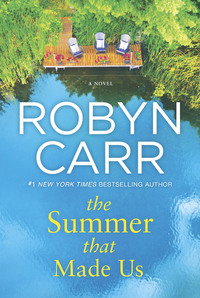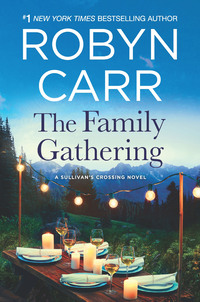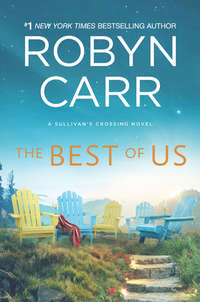
Полная версия
The View From Alameda Island
Lauren listened absently and fixed him a bourbon, watered, because they had to go to that fund-raiser tonight. She poured herself a glass of burgundy. This was her job, to listen and let him rant, to nod and occasionally say, That must make you so angry. While she did that, he paced or sat at the breakfast bar and she unwrapped some cheese and crackers and grapes for him to snack on.
But while all this was going on she was thinking about the man with the easy smile, the tiny bit of gray, the dark blue eyes. And she fantasized how nice it would be to have someone come home and not be a complete asshole.
“We might think about getting ready for the dinner,” she said. “I’d like to look at the auction items.”
“I know, I know,” he said. “I bought a table. We shouldn’t be too late.”
Of course people would expect him to be late, to rush in at the last minute. “I’m ready. Do you need a shower?”
“I’ll be down in five minutes,” he said, leaving and taking his bourbon with him.
“Happy anniversary,” she said to his departing back.
“Hmph,” he said, giving a dismissive wave of his hand. “Nice anniversary,” he grumbled. “My schedule is all fucked up.”
* * *
The charity event was for the local Andrew Emerson Foundation supporting underprivileged children. They came to be known as Andy’s kids. Tonight’s event would raise money to provide scholarships for the children of fallen heroes. Professional athletes, businesses, the Chamber of Commerce, hospitals, veterans’ groups and unions from San Francisco and Oakland supported the charity with fund-raising events such as this dinner and auction. Andy Emerson was a billionaire software developer in San Francisco; he was politically influential and admired by people like Brad. Brad never missed an event and claimed Andy as a friend. Brad was a fixture at the golf tournaments and donated generously. The children of military men and women and first responders disabled or killed in the line of duty could apply for the scholarships generated tonight. To be fair, Lauren had a great deal of respect for the foundation and all that it provided. She also happened to like Andy and Sylvie Emerson, though she was not so presumptuous as to claim them as friends. This event was a very popular, well-organized dinner that would raise tens of thousands of dollars.
Brad and Lauren attended this and many other similar events; Brad’s office and clinic staff were invited and he usually paid for a table. This was one of the few times during the year that Lauren visited with Brad’s colleagues. And while Brad might be primarily fond of Andy’s assets, Lauren thought the seventy-five-year-old Emerson and his wife of almost fifty years, Sylvie, were very nice people. It’s not as though Brad and Lauren were invited over to dinner or out for a spin on the yacht—the Emersons were very busy, involved people. However, it was not unusual for Brad to get a call from some member of the Emerson family or a family friend with questions about an upcoming medical procedure or maybe looking for a recommendation of a good doctor.
Just as she was thinking about them, Sylvie Emerson broke away from the men she was chatting with and moved over to Lauren. She gave her one of those cheek presses. “I’m so happy to see you,” Sylvie said. “I think it’s been a year.”
“I saw you at Christmastime in the city,” Lauren reminded her. “You’re looking wonderful, Sylvie. I don’t know how you do it.”
“Thank you. It took a lot of paste and paint. But you’re aglow. How are the girls?”
“Thriving. Lacey is doing her post-grad study at Stanford so we see her fairly often. Cassidy graduates in about six weeks.”
“UC Berkeley, isn’t it?” Sylvie asked. “What’s her field?”
Lauren chuckled. “Pre-law. She’s scored beautifully on the LSAT and is bound for Harvard.”
“Oh my God. Are you thrilled for her?”
“I don’t know yet,” Lauren said. “Don’t you have to be a real tiger to take on law? Cassie seems so gentle-natured to me.”
Sylvie patted her arm. “There is a special place within the legal system for someone like her. I don’t know where, but she’ll find it. And no one chose medicine?”
Lauren shook her head. “I’m a little surprised about that, since I have a science major as well. Though it’s been so long ago now that—”
She was distracted by a man who had been pressing his way through the crowd with two drinks and suddenly stopped. “Lauren?” he said. Then he smiled and those dark blue eyes twinkled. “I’ll be damned.”
“Beau?” she asked. “What in the world are you doing here?”
“Same as you, I suppose,” he said. Then he looked at Sylvie and said, “Hi, I’m Beau Magellan. I just recently ran into Lauren at church.”
Lauren laughed at that. “Not exactly, but close enough. Beau, this is Sylvie Emerson, your hostess tonight.”
“Oh!” he said, sloshing the drinks. “Oh jeez,” he mumbled. Finally, laughing, Lauren took his drinks so he could shake Sylvie’s hand...after wiping his hands on his trousers. “It’s a pleasure, Mrs. Emerson. I’m personally indebted to you!”
“How so, Mr. Magellan?”
“My sons have a friend whose dad was killed on the job, Oakland police, and she received a scholarship. Now I’m a big supporter of the cause.”
“Magellan,” Sylvie said. “Why does that sound familiar?”
“I have no idea,” he said, chuckling. “I’m sure our paths wouldn’t have crossed. Magellan Design is my company. It’s not a big company...”
She snapped her fingers. “You designed a rooftop garden for my friend, Lois Brumfield in Sausalito!”
He beamed. “I did. I’m very proud of that, too—it’s incredible.”
Sylvie looked at Lauren. “The Brumfields are getting up there... Aren’t we all... And they have a single-story home in Sausalito. They didn’t have any interest in a two-story anything, their knees are giving out. So they put the garden on the roof! And they have a lift! They sit up there any evening the weather will allow. It’s gorgeous! They have gardeners tend their roof!” Sylvie laughed. “They have a patio on the ground floor as well, nice pool and all that. But that rooftop garden is like their secret space. And the house is angled just right so it’s private. From there they have an amazing view.”
“There’s a hot tub,” Beau said. “And a few potted trees in just the right places.”
“Really, if the Brumfields had more friends, you’d be famous!”
“They have you,” Beau said.
“Oh, I’ve known Lois since I was in college. She’s outlasted most of my family!” Then she looked at Lauren. “Church?”
Lauren laughed. She put Beau’s drinks on the table she stood beside. “I stopped to see the gardens at Divine Redeemer Catholic Church—they’re beautiful. And they’re right on my way home. Beau was replacing a few plants. I thought he was the groundskeeper.” She made a face at him.
“I love the grounds and I’ve known the priest there for a long time,” Beau said. “I gave them an updated design and got them a discount on plants.”
“Do you have a card, Mr. Magellan?” Sylvie asked.
“I do,” he said. He pulled one out of his inside jacket pocket. “And please, call me Beau.”
“Thank you,” she said, sliding it into her slender purse. “And of course, I’m Sylvie. Lauren, the weather is getting nice. If I give you a call, will you come to my house, have lunch in my garden? Just you and me?”
“I would love that,” she said. “Please do call! I’ll bring you a plant!”
“I’ll call. Very nice meeting you, Beau. Excuse me please. I have to try to say hello to people.”
And that fast she was gone.
Lauren looked at Beau. “What am I going to do with you? Met me at church, did you?”
“In a manner of speaking,” he said. “Seeing you here is even more startling.”
“We’re big supporters,” she said. “See that bald guy over there? With Andy? My husband.”
“Hm,” he said. “He’s friends with the host? Andy Emerson?”
“He believes so,” she said. “Like I said, big supporter. Do you play golf?”
“I know how,” Beau said. “I don’t know that you could say I play, in all honesty.”
“That’s right,” she said, laughing. “You read psychology. And fish. And garden.” She glanced at the drinks. “Should you get those drinks back to your table?”
“They weren’t dehydrated last time I looked. They’re signing up for auction items.”
“It’s possible we have friends in common,” she said. “My brother-in-law is an Oakland cop. I remember a fatality a couple of years ago.”
“Roger Stanton,” Beau said. “Did you know him?”
She shook her head. “Did you know him?”
“No, but the boys know the kids. You’ll have to ask your brother-in-law...”
“Oh, Chip knew him. Even though it’s a big department, they’re all friends. It was heartbreaking. I’m so glad his daughter is a recipient.” She nodded toward the drinks. “You should probably get those drinks back to your wife...”
He shook his head. “She’s not here tonight. I brought my boys, my brother and sister-in-law and a friend.”
“But not your wife?” she asked.
“Pamela finds this sort of thing boring and the friend I brought is a guy. But I don’t find things like this boring. So tell me, what are you doing Tuesday?”
“What are you doing?” she asked.
“I’m going to check on the plants, maybe hoe around a little bit. H-O-E,” he specified, making her laugh. “I’m going to put some bunny deterrent around. See how things are doing. I like the plants to get a strong hold before summer. Do you think you’ll want to be uplifted by flowers?”
“You’re coming on to a married woman,” she said.
“I apologize! I don’t want to make you uncomfortable. I’ll get out of your space,” he said, picking up the drinks.
“I might check out the plants,” she said. “Now that I’m pretty sure you’re not a stalker or serial killer.”
“Oh Jesus, do I give off that vibe?” he asked, sloshing the drinks over his hands again. “I’m going to have to work on my delivery!”
“You sure don’t give off the waiter vibe,” she said, lifting a napkin from the table to assist him.
Just then, Brad was at her side. “We’re down in front, Lauren. Don’t make me come looking for you.”
“I know. Brad, this is Beau Magellan, a landscape designer. A friend of Sylvie’s.”
Brad’s black eyebrows shot up. “Oh? Maybe we’ll have you take a look at ours.” He put out a hand to shake, once he heard there was an Emerson connection, but Beau’s hands were full of drinks. They were wet besides.
“Oh. Sorry,” Beau said, lifting his handfuls clumsily.
“Okay,” Brad said with a laugh. “Another time. I’ll save you a seat,” he said to Lauren.
“Sure. Be right there.” She looked back at Beau, a mischievous smile playing at her lips.
“You’re a liar, Lauren,” Beau said.
“I’m sorry.” She laughed. “It was irresistible. I hope we run into each other again, Beau. Now if there’s anything left in those glasses, get them to your table.”
CHAPTER TWO
Lauren knew she’d be going to the church gardens on Tuesday after work even though she thought it could be foolhardy. Becoming attracted to a man was not a part of her plan. In fact, it could be a major inconvenience. But she liked him. She liked that he read a lot and wanted to talk about what he’d read. She enjoyed how flustered he was meeting Sylvie. She adored the way he sloshed the drinks he carried. And it moved her that he was there to support a scholarship recipient who’d lost her father.
Of course he was there. She saw his back moving through the plants and shrubs. He was pulling off dead leaves and dried flowers. And putting them in his pocket!
She noticed there were some things on the bench—the one she had occupied the last time. A bag containing something and two Starbucks cups. It made her smile. He shouldn’t have known that Starbucks would make her happy.
She cleared her throat. He turned toward her with a smile, shoving a handful of dead leaves and buds in his pocket.
“Hi,” he said. “I brought you a mocha with whipped cream.”
Perfect! Of course. “That’s very thoughtful,” she said, just standing there, feeling awkward.
“And something else,” he said, lifting the bag.
“Oh, why did you do that? You shouldn’t be giving me things. You should sit and relax and enjoy the flowers. And you were tidying up.”
“I’m always grooming plants. Maybe it’s a nervous habit.” He pulled a handful of dried leaves and small sticks from his pocket, dumping them in the trash can. He handed her the bag. Inside was a book. Flow: The Psychology of Optimal Experience.
“This is great!” she said. “I actually went looking for this book! But I didn’t ask for it, just looked in the psychology section.”
“I had to find it at the used bookstore...”
“Did it change your life?”
“No, but it was enlightening.”
She sat down on the bench, looking through the book. He handed her a coffee and stood at the other end of the bench. “I guess it didn’t make your wife any happier,” she said.
“No,” he answered with a laugh. “She has always wanted something more. Something else. Listen, full disclosure, my wife and I are separated. We’ve been living apart for six months. We’re getting divorced.”
“Ah,” Lauren said. “And you’re getting back in the game.”
He looked stricken. “No! I mean, that has nothing to do with you! I’m not looking for anything. You’re a complete surprise. I might’ve done this even if—” He shook his head, looking embarrassed. “You just seem like a very nice person, that’s all. And you complimented my flowers. This divorce—it’s long overdue. It’s not our first separation. And no, I haven’t been known to mess around on the side. I have a couple of sons. Stepsons, actually. I wanted to keep their lives stable for as long as possible. They’re seventeen and twenty. I think they understand we should be divorced and that I’ll always have a home for them. If they don’t know they can count on me by now, they never will. I’m not going anyplace.”
“And their mother?” she asked.
“She loves them, of course,” he said. “Maybe because they’re boys, they’re closer to me. Or maybe it’s because their mother is hard to please.”
“Oh God,” she said. “It is not a good thing that we have this in common.”
“You’re separated?”
“Not yet,” she said, hesitantly. “I have a difficult situation. I’m not ready to talk about it. But can you tell me about yours? Unless it’s too...” She shrugged.
He settled in, sitting on the bench with his coffee. “Okay, I’ll give you the short version. I’ve been married twelve years. We lived together first. The boys were four and seven when we met. They have two different fathers. Disinterested fathers. Pamela wasn’t married to either of them. They hardly came around and when they did, they took only their son, not his brother. That just didn’t make any sense to me. They’re adults. Don’t they realize little boys would be upset by that? Feel left out? Have self-confidence issues? So if I knew one or the other was coming to get his son I tried to have something planned for the one left behind. It didn’t take much—just a little extra time to throw the ball around or play a video game. Just attention, that’s all.”
“That’s so...nice,” she said.
“No it’s not,” he said, almost irritably. “It’s what an adult should do. It just makes sense. Doesn’t it?”
“What did their mother say? About one son being left behind?”
“She was in conflict with their fathers over lots of things, so it was one more thing. But that didn’t matter to me. Mike and Drew were little kids. They had enough trouble, you know? The school was saying Drew had learning disabilities and they tried to pin ADHD on Mike because he was restless. He was restless because he was a boy with a lot of energy who was kind of bored with school. Pamela would get mad, which didn’t seem to resolve anything so I started going to some of these meetings at the school with her and we worked out programs for them. Pretty soon I was going to the meetings alone.” He stopped and ran a hand around the back of his neck. “On our good days, she was very grateful I was willing to take them on. On our bad days she accused me of thinking I was their father and she reminded me I had no authority.”
“I’m sorry,” Lauren said.
“Drew graduates with honors in a few weeks,” he said with a smile. “So much for his learning disability. Mike’s in college with a nice GPA. He’s got a great girlfriend, plays baseball, has lots of friends. Wants to be an architect,” he added with a proud but shy smile.
“When did you know?” she asked. He gave her a perplexed look. “When did you know the marriage wouldn’t last?”
“Almost right away,” he said. “Within a couple of years. But I wasn’t giving up. The guys... They might have two different fathers but they were going to have one stepfather. We did fine. We managed. I might still be managing but Pamela wanted to leave and I didn’t put up a fight. At all.” He laughed uncomfortably. “Then she wanted to come back and I said, no.”
“I guess you’re done,” Lauren said.
“My mother says I’m a peacekeeper. She didn’t consider it a compliment.”
“Shame on her,” Lauren said. “We could use a little more compromise and cooperation in this world!”
“Spoken like a true peacekeeper,” he said. “As military ordnance, a Peacekeeper is a land-based ICBM. A nuclear missile. Maybe all those people who take us for granted should look out.”
“Indeed,” she said, smiling in spite of herself.
Then they both burst into laughter.
“How long have you been friends with Sylvie Emerson?” Beau asked.
“I’m not so sure we’re really friends,” she said. “We know each other because of our husbands. I’m sure we like each other. We run into each other at fund-raisers and social events. We’re friendly, that’s all. My husband served on the foundation board of directors for a few years and got cozy with a lot of Andy’s friends. It’s not that he’s passionate about the cause. He’s passionate about being connected and about Andy’s billions and influence, though what he hopes to do with either is beyond me. That’s why I run into Sylvie a lot—Brad hangs close. He would deny that, by the way. I’ll be surprised if she calls me for that lunch date—she’s very busy. But let me tell you something. What I know of the Emersons is they’re both sincerely good, generous people. Sylvie has mentioned that of all the work their foundation is able to do, she’s partial to the scholarship fund. She and her husband might not have identical priorities, I’m not well acquainted with Andy, but Sylvie has told me more than once—we have to feed and educate the next generation, that’s the only way we leave the world better than we found it.”
“I wonder if they even realize how great a gift that is—giving an education. I don’t know about you, but my family wasn’t exactly fixed to send me to college.”
“Nor was mine,” she said. “I grew up poor.”
“What’s poor?” he asked, raising an eyebrow.
“I have a younger sister, Beth. Three years younger. When she was a baby our father went out for the proverbial pack of cigarettes and never came home. My mom worked two jobs the whole time we were growing up. My grandparents were alive and lived nearby, thank God. They helped. They watched us so she could work and probably chipped in when rent was late or the car broke down.”
He smiled. “I have a large extended family. The six of us—my mom, dad, brother, two sisters and I lived in an old garage my parents converted into a small house. My mom still lives in that house, but I don’t know how long that’s going to last—she’s getting a little feeble. My dad was a janitor, my mom served lunch at the junior high and cleaned houses. We got jobs as soon as we were old enough. But my folks, under-educated themselves, pushed us to get decent grades even though they couldn’t help us with homework. We did our best. We might’ve been competing with the cousins a little bit.”
“Nothing like a little healthy competition,” she said. “Did you know you were poor?”
“Sure, to some extent. But we had a big family on that land. A couple of aunts and uncles, grandparents, cousins. Sometimes it got crowded. But if the heat went out in winter there were plenty of people to keep warm with. Heat in summer—no relief.” He drank a little of his coffee. “We didn’t have any extras, but it wasn’t a bad way to grow up. Thing about it was we might’ve been poor but we were never poor alone.”
“Can I ask you a personal question?”
“You can always ask, Lauren...”
“How do you think your life’s going to change, getting divorced? Does this begin a whole new adventure of some kind?”
“Adventure?” he asked. “God no. My life doesn’t have to change. I love my life today. I have work that makes people happy, good friends, amazing family. I have enough predictability every day so that it’s not very often that something throws me off balance. I sleep well. My blood pressure is good. I don’t know if I could have a better life. I just don’t want it to change back.”
She was quiet for a long moment. Finally she said, “Life must have been difficult... Before...”
“That’s a hard question,” he said. “Difficult? There were days I thought it was hard. Unbearable, really. But those days passed. What didn’t pass was irritation. Unbalance. Never knowing what would be coming at you today. But ask anyone—you’re not allowed to bail out because your wife has mood swings. Or because she yelled and now and then threw a glass at me. Hey, she missed, and cleaned up the shattered glass. But she wasn’t a drunk, she never came at me with a knife, didn’t sleep around...not counting those separations, when the excuse was that we were separated. According to the rule book, if you’re able to work it out...” He shrugged. “So I stopped asking myself if I could live like this because I could, but that was the problem. I started asking myself if I wanted to live my life like that. And the answer was no. Fortunately for me, Pamela needed a little time to think again, to determine what she wanted from life. She needed another separation. Our fourth in a thirteen-year relationship. It was the perfect time for me to say, me, too.” He chuckled. “Her separation was very short after hearing that. Mine was not. I decided I was happier on my own. I think I could be a happy old bachelor.” He grinned. “I wouldn’t have a boring or lonely day in my life. I think the boys might look in on me sometimes, make sure I haven’t broken a hip.”
“How old are you?” she asked.
“Forty-five,” he said.
She snorted. “I don’t think you have to worry about that broken hip for a while yet.”
“I’m just saying, my life right now is fine. More fine than it was wondering which Pamela was coming home to dinner. But being sick of living with a volatile, angry, unpredictable person is not moral grounds for divorce. For better or worse, right?”
Lauren identified with so much of what he said but her first thought was, it’s so much easier for men. They’re not expected to have to put up with moody, angry women but women are supposed to put up with difficult men. She really wanted to let loose and complain about what it was like to live with a controlling, angry man. A man who could keep an argument going for days. A man who cut the line of people waiting to purchase movie tickets, loudly accused maître d’s of losing the reservation he never made, shortchanged maintenance workers on their bills because he assumed they wouldn’t dare come after him because they were undocumented or spoke poor English. Once while they were vacationing in Turks and Caicos he found some lounge chairs by the pool that were desirable, but they had towels on them—someone had already claimed them. There were a couple of pool toys as well, indicating they belonged to children. He threw the towels and toys on the ground beside the chairs, claimed the chairs for himself and his family and when a young man with two small children appeared five minutes later, he briskly told him, “You can’t save chairs with towels. You have to be using them.”








